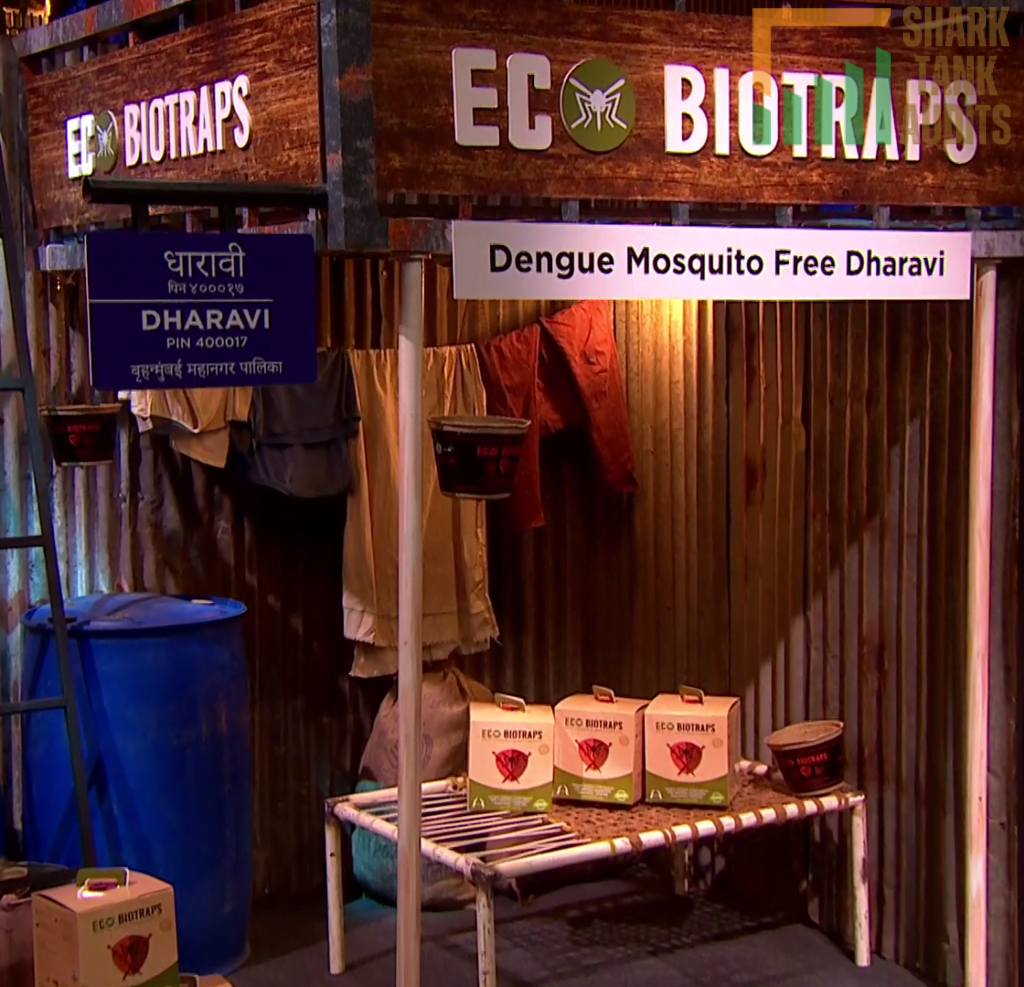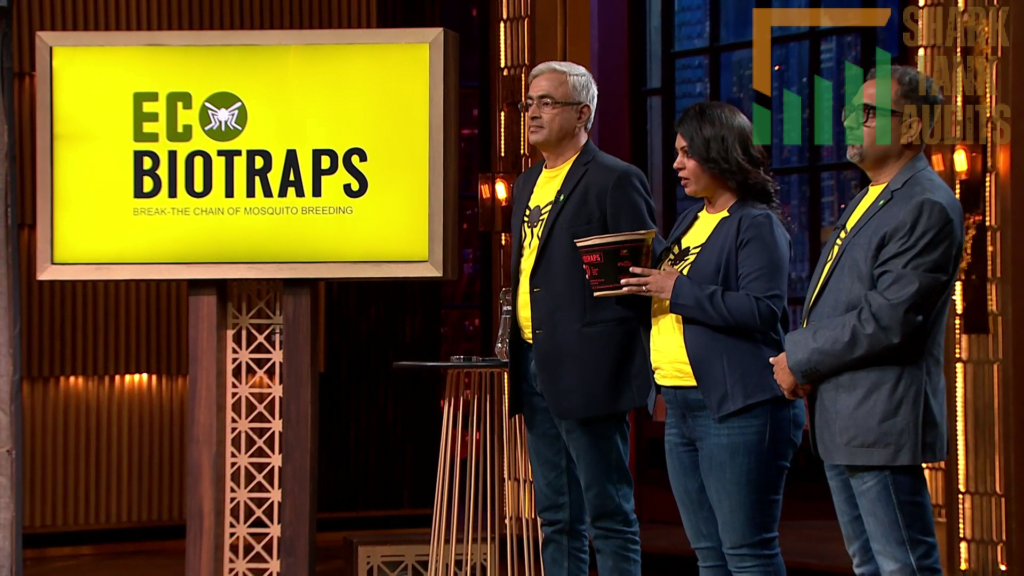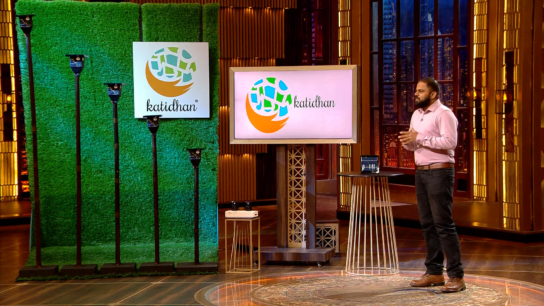EcoBioTraps Shark Tank India Episode Review
Website: https://ecobiotraps.com/ (WordPress platform, low/no SEO)
Shark Tank India:
- Season 3, Episode 18
- Air Date: February 14, 2024
- Founders: Prasad Harish Phadke, Binal Shah, Nitin Khope
- Investment Ask: ₹50 lakh for 2% equity
- Deal: None
- Investors: None
- Company Valuation: ₹25 crore

| Index | Show Segment | Details |
|---|---|---|
| 1 | Promo Overview | Three business pitchers presented a basket-like product as a mosquito solution in Shark Tank India Season 3 promo. |
| 2 | Pitch on Shark Tank | One of the pitchers energetically explained their business on the Shark Tank India stage, seeking investment. All Shark judges showed interest. |
| 3 | Eco BioTraps Vision | Aims to be the world’s first 100% biodegradable mosquito trap. Uses a Passive GREEN Device to prevent mosquito breeding and ensure a safe environment. |
| 4 | Eco BioTraps Founders | Founders include Prasad Harish Phadke, Binal Shah, and Nitin Khope. Prasad is a production engineering graduate, Binal serves as COO with 17 years of experience, and Nitin, a mechanical engineering graduate, manages customer access. |
| 5 | About Eco BioTraps | Sustainable product to prevent mosquito breeding without electricity, batteries, or recharging. Bio-degradable, creating a mosquito-free environment. |
| 6 | Eco BioTraps Business Statistics | Business started in 2019. |
| 7 | Shark Tank India Pitch | Enthusiastic pitch with all Shark judges showing interest. Vineeta Singh mentioned the contagious energy that had everyone excited. |
| 8 | Deal Details | Pitched for ₹50 lakhs for 2% equity, but no deal was finalized. |
| 9 | Shark Tank Episode Information | Season 3, Episode 18, aired on February 14, 2024. |
| 10 | Conclusion | Shark Tank India pitch showcased a unique mosquito control product. Interested to know if viewers were already aware of this innovation. Suggestions welcomed for integrating successful businesses into government plans and fostering new ideas. |
Product:
- Eco BioTraps is a mosquito control device offering an eco-friendly solution to prevent breeding.
- 100% biodegradable, it requires no electricity, batteries, or recharging.
- Mimics a mosquito breeding environment, then controls their population.
Conclusion:
- Eco BioTraps is an innovative product with potential for effective mosquito control.
- Marketing and sales strategy improvements are needed.
- Government partnerships hold great opportunity.
Additional Notes:
- WordPress website with low/no SEO, requiring website and online marketing improvements.
- Government partnerships could expand product distribution.
Suggestions:
- Improve website and online marketing presence.
- Explore government partnership opportunities.
- Find new ways to distribute product at scale.
Other Comments:
- Eco BioTraps is innovative with potential for effective mosquito control.
- Success depends on refining marketing and sales strategies.
Shark Tank India Judges’ Response:
- All judges were impressed by the Eco BioTraps product.
- Concerns existed about valuation and sales strategy.
- No deal, but valuable advice was given.
Moving Forward:
- Refine marketing and sales strategies.
- Explore government partnership opportunities.
- Find new ways to distribute product at scale.
While the idea of a basket-like product for preventing mosquito breeding is creative, there are several factors to consider before concluding its effectiveness and feasibility. Here’s an analysis:
Potential benefits:
- Accessibility: A simple and potentially low-cost product could be appealing in resource-limited settings.
- Multiple uses: The basket could serve other purposes, like storing fruits or vegetables, increasing its value proposition.
- Visual barrier: Covering water sources might disrupt mosquito egg-laying behavior.
- Community involvement: Locally-produced baskets could empower communities and offer economic opportunities.
Challenges and limitations:
- Efficacy: The design needs careful consideration to truly prevent egg-laying and larval development. Mosquitoes can lay eggs on the sides or even inside the basket if left open.
- Maintenance: Baskets need cleaning and repositioning regularly to prevent stagnant water and breeding.
- Large-scale implementation: Distributing and maintaining baskets over large areas could be logistical and resource-intensive.
- Sustainability: Materials need to be durable and eco-friendly for long-term effectiveness.
- Addressing root causes: The basket would be a reactive measure; tackling standing water sources and promoting environmental management are crucial for long-term mosquito control.
Alternative solutions:
- Larvicides: Bio-friendly larvicides can be applied to standing water sources.
- Predators: Introducing mosquito predators like fish or copepods can naturally control populations.
- Source reduction: Modifying environments to eliminate standing water breeding sites is a sustainable approach.
- Public awareness: Educating communities about mosquito breeding and prevention methods is essential.
To improve the basket concept:
- Incorporate mesh with specific pore sizes to prevent egg-laying while allowing water flow.
- Design with an easily removable lid for efficient cleaning and maintenance.
- Explore materials like bamboo or recycled plastic for sustainability.
- Combine the basket with other control methods for a multi-pronged approach.
Remember, successfully tackling mosquito breeding requires a holistic approach, considering ecological, social, and economic factors. While the basket concept holds some promise, further research and development are needed to assess its true effectiveness and integrate it into comprehensive mosquito control strategies.
Eco BioTraps: Business Plan

1. Executive Summary:
Eco BioTraps offers a revolutionary, sustainable solution to mosquito breeding – a 100% biodegradable trap that disrupts the breeding cycle without resorting to harmful chemicals, electricity, or recharging. Targeting individuals and communities plagued by mosquitoes, Eco BioTraps provides an eco-friendly and effective way to create a safe, mosquito-free environment.
2. Business Potential in India:
- Mosquito Burden: India bears a significant burden of mosquito-borne diseases, with over 1.5 million malaria cases annually. (Source: World Health Organization)
- Growing Awareness: Rising health concerns and environmental consciousness fuel demand for sustainable mosquito control solutions.
- Limited Options: Existing methods often rely on chemicals or expensive, non-biodegradable products.
3. Total Addressable Market (TAM):
- Considering India’s population of 1.4 billion and the prevalence of mosquito-prone areas, the TAM for mosquito control solutions is vast.
- Targeting 20% of households in mosquito-prone areas (estimated 100 million households), the TAM translates to a ₹40,000 crore opportunity.
4. Ideal Target Audience:
- Demographics: Families, individuals, and communities residing in mosquito-prone areas, including urban and rural settings.
- Psychographics: Health-conscious consumers, environmentally aware individuals, and those seeking safe and natural solutions.
5. Marketing Strategy:
- Digital Marketing: Leverage social media platforms (Facebook, Instagram) and targeted campaigns to reach the target audience.
- Content Marketing: Create informative blog posts, videos, and infographics highlighting the benefits of Eco BioTraps and mosquito control awareness.
- Strategic Partnerships: Collaborate with NGOs, public health organizations, and environmental groups for wider reach and credibility.
- Community Outreach: Conduct educational programs and workshops in vulnerable communities.
6. Content and Digital Marketing Strategy (as per Target Audience):
- Develop relatable content: Use visuals, stories, and testimonials showcasing families and individuals using Eco BioTraps effectively.
- Focus on health and environmental benefits: Emphasize the safety and eco-friendliness of the product compared to traditional solutions.
- Utilize local languages and adapt messaging: Cater content to resonate with different regions and demographics.
- Run interactive contests and social media campaigns: Encourage engagement and spread brand awareness.
7. Distribution Strategy:
- E-commerce platforms: Partner with major e-commerce websites to reach a wider online audience.
- Retail stores: Establish partnerships with supermarkets, pharmacies, and home improvement stores.
- NGO and community distribution: Collaborate with organizations for distribution in vulnerable areas.
- Direct sales through the Eco BioTraps website: Offer convenient online purchasing options.
8. Advantages:
- Sustainable and biodegradable: Environmentally friendly alternative to traditional chemical solutions.
- Safe and non-toxic: Suitable for homes with children and pets.
- Effective and long-lasting: One trap lasts 4-6 weeks, effectively breaking the mosquito breeding cycle.
- Easy to use: No electricity, batteries, or refills required. Simply add water and set it up.
- Cost-effective: Affordable compared to chemical repellents or electronic traps.
9. Challenges:
- Building brand awareness: Entering a competitive market with established brands.
- Educating consumers: Highlighting the unique value proposition and dispelling misconceptions about biodegradability.
- Ensuring consistent supply and distribution: Meeting demand across diverse regions.
- Maintaining affordability: Balancing production costs with competitive pricing.
10. Reasons for Success and Mitigation Strategies:
- Strong product with unique selling proposition: Focus on the eco-friendly, safe, and effective nature of Eco BioTraps.
- Data-driven marketing and targeted strategies: Continuously optimize campaigns based on audience insights and performance data.
- Strategic partnerships and community engagement: Leverage collaborations for wider reach and build trust.
- Focus on affordability and accessibility: Explore cost-efficient production practices and partnerships for wider distribution.
- Commitment to research and development: Continuously improve product efficacy and explore new sustainable innovations.
11. Future Business:
- Expand product line: Develop variations for different environments and mosquito species.
- Partner with research institutions: Innovate and create next-generation mosquito control solutions.
- Explore international expansion: Offer Eco BioTraps to mosquito-prone regions globally.
- Promote social impact: Collaborate with organizations on mosquito control programs in vulnerable communities.
12. Roadmap to Increase Valuation:
- Achieve consistent sales growth: Focus on expanding market share and securing distribution partnerships.
- Secure funding for expansion: Attract investors with a clear vision, strong team




